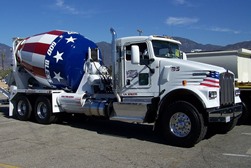How to Choose the Right Truck Driving Classes near Ontario California
 Congrats on your decision to become a trucker and enroll in a trucking school near Ontario CA. Perhaps it has always been your goal to hit the open road while driving a big ole tractor trailer. Or possibly you have done some analysis and have discovered that a career as a truck driver provides good pay and flexible work opportunities. No matter what your reason is, it's important to obtain the appropriate training by selecting the right CDL school in your area. When evaluating your options, there are various variables that you'll need to think about prior to making your ultimate choice. Location will certainly be important, especially if you have to commute from your Ontario home. The expense will also be important, but picking a school based solely on price is not the optimal way to ensure you'll get the right education. Don't forget, your objective is to master the skills and knowledge that will enable you to pass the CDL exams and become a professional truck driver. So keeping that objective in mind, just how do you select a truck driving school? The answer to that question is what we are going to address in the balance of this article. But first, we are going to discuss a little bit about which commercial driver's license you will eventually need.
Congrats on your decision to become a trucker and enroll in a trucking school near Ontario CA. Perhaps it has always been your goal to hit the open road while driving a big ole tractor trailer. Or possibly you have done some analysis and have discovered that a career as a truck driver provides good pay and flexible work opportunities. No matter what your reason is, it's important to obtain the appropriate training by selecting the right CDL school in your area. When evaluating your options, there are various variables that you'll need to think about prior to making your ultimate choice. Location will certainly be important, especially if you have to commute from your Ontario home. The expense will also be important, but picking a school based solely on price is not the optimal way to ensure you'll get the right education. Don't forget, your objective is to master the skills and knowledge that will enable you to pass the CDL exams and become a professional truck driver. So keeping that objective in mind, just how do you select a truck driving school? The answer to that question is what we are going to address in the balance of this article. But first, we are going to discuss a little bit about which commercial driver's license you will eventually need.
Which Commercial Drivers License Will You Need?

To operate commercial vehicles lawfully within the United States and Ontario CA, an operator must attain a CDL (Commercial Driver's License). The three license classes that one can qualify for are Class A, Class B and Class C. Given that the topic of this article is how to select a truck driver school, we will discuss Class A and Class B licenses. What differentiates each class of CDL is the type of vehicle that the driver can operate as well as the GVWR (Gross Vehicle Weight Rating) or GCWR (Gross Combination Weight Rating). Below are brief explanations for the 2 classes.
Class A CDL. A Class A CDL is needed to operate any vehicle that has a GCWR of more than 26,000 lbs., including a towed vehicle of more than 10,000 lbs. Some of the vehicles that operators may be able to drive with Class A licenses are:
- Interstate or Intrastate Tractor Trailers
- Trucks with Double or Triple Trailers
- Tanker Trucks
- Livestock Carriers
- Class B and Class C Vehicles
Class B CDL. A Class B Commercial Drivers License is needed to operate single vehicles having a GVWR of greater than 26,000 lbs., or a GCWR of more than 26,000 lbs. including a towed vehicle weighing up to 10,000 lbs. Several of the vehicles that operators may be qualified to drive with Class B licenses are:
- Tractor Trailers
- Dump Trucks
- Cement Mixers
- Large Buses
- Class C Vehicles
Both Class A and Class B Commercial Drivers Licenses may also need endorsements to drive specific kinds of vehicles, for instance school or passenger buses. And a Class A licensee, with the proper required endorsements, may operate any vehicle that a Class B licensee is authorized to operate.
How to Evaluate a CDL School

When you have decided which CDL you would like to obtain, you can start the undertaking of researching the Ontario CA trucking schools that you are considering. As already mentioned, location and cost will undoubtedly be your primary considerations. But it can't be stressed enough that they should not be your sole concerns. Other issues, such as the reputations of the schools or the experience of the instructors are similarly or even more important. So below are several more factors that you should research while conducting your due diligence before choosing, and particularly paying for, your truck driving training.
Are the Schools Certified or Accredited ? Very few truck driving schools in the Ontario CA area are accredited due to the rigorous process and cost to the schools. On the other hand, certification is more prevalent and is offered by the Professional Truck Driver Institute (PTDI). A school is not required to become certified, but there are a number of advantages. Potential students know that the training will be of the highest caliber, and that they will get an ample amount of driving time. For example, PTDI calls for 44 hours of real driving time, not ride-alongs or simulations. So if a school's program is certified (the program, not the school is certified), students know that the curriculum and training will fulfill the very high standards set by PTDI.
How Long in Operation? One clue to help determine the quality of a trucking school is how long it has been in business. A negatively reviewed or a fly by night school usually will not be in business very long, so longevity is a plus. However, even the best of Ontario CA schools had to start from their opening day of training, so consider it as one of several qualifiers. You can also ask what the school's history is regarding successful licensing and job placement of its graduates. If a school won't provide those stats, look elsewhere. The schools should additionally maintain associations with local and national trucking companies. Having numerous contacts not only points to a quality reputation within the industry, but also boosts their job assistance program for graduates. It also wouldn't hurt to check with the California licensing department to confirm that the CDL trucker schools you are reviewing are in good standing.
How Good is the Training? As a minimum requirement, the schools should be licensed in California and hire instructors that are trained and experienced. We will talk more about the instructors in the next segment. Also, the student to instructor proportion should not be greater than 4 to 1. If it's any higher, then students will not be receiving the individual instruction they will need. This is particularly true regarding the one-on-one instruction for behind the wheel training. And watch out for any school that claims it can train you to be a truck driver in a comparatively short time frame. Training to be a truck driver and to drive a tractor trailer skillfully takes time. Most Ontario CA schools provide training courses that run from 3 weeks to as long as two months, depending on the class of license or kind of vehicle.
How Good are the Trainers? As already stated, it's imperative that the teachers are qualified to teach driving methods and experienced as both drivers and instructors. Although several states have minimum driving time prerequisites to be certified as a teacher, the more professional driving experience an instructor has the better. It's also crucial that the teachers keep up to date with industry advancements or any new laws or changes in regulations. Assessing teachers might be a bit more intuitive than other standards, and possibly the ideal approach is to pay a visit to the school and talk to the teachers face to face. You can also speak with a few of the students going through the training and ask if they are happy with the level of instruction and the teacher's qualification to train them.
How Much Driving Time? Most importantly, an excellent truck driver school will provide lots of driving time to its students. After all, isn't that what it's all about? Driving time is the actual time spent behind the wheel driving a truck. Even though the use of ride-a-longs with other students and simulators are essential training methods, they are no substitute for actual driving. The more instruction that a student receives behind the wheel, the better driver he or she will be. Although driving time varies between schools, a reasonable benchmark is a minimum of 32 hours. If the school is PTDI certified, it will provide a minimum of 44 hours of driving time. Check with the Ontario CA schools you are looking at and find out how much driving time they furnish.
Are they Captive or Independent ? It's possible to receive discounted or even free training from certain truck driver schools if you enter into an agreement to be a driver for a particular carrier for a defined period of time. This is referred to as contract training, and the schools that provide it are called captives. So instead of maintaining affiliations with numerous trucking lines that they can refer their students to, captives only work with one company. The tradeoff is receiving less expensive or even free training by giving up the freedom to initially be a driver wherever you choose. Obviously contract training has the potential to restrict your income opportunities when beginning your new career. But for some it may be the ideal way to get affordable training. Just make sure to find out if the Ontario CA schools you are considering are captive or independent so that you can make an informed decision.
Provide Onsite CDL Testing? There are some states that will allow 3rd party CDL testing onsite of trucking schools for its graduates. If onsite testing is permitted in California, find out if the schools you are considering are DMV certified to offer it. One benefit is that it is more convenient than competing with graduates from competing schools for test times at California testing locations. It is moreover an indication that the DMV views the approved schools to be of a higher quality.
Are the Classes Accessible? As formerly noted, truck driving training is just 1 to 2 months in length. With such a brief term, it's essential that the Ontario CA school you select offers flexibility for both the curriculum and the scheduling of classes. As an example, if you're having difficulty learning a certain driving maneuver, then the instructor should be willing to dedicate more time with you until you are proficient. And if you're still employed while going to training, then the class scheduling must be flexible enough to fit in working hours or other commitments.
Is Job Placement Offered? The moment you have obtained your commercial driver's license after graduating from truck driver school, you will be eager to start your new career. Verify that the schools you are contemplating have job placement programs. Find out what their job placement ratio is and what average salary their graduates start at. Also, find out which national and local trucking companies their graduates are placed with for employment. If a school has a lower job placement rate or not many Ontario CA employers recruiting their grads, it may be a sign to search elsewhere.
Is Financial Assistance Provided? Truck driving schools are comparable to colleges and other Ontario CA area trade or technical schools when it comes to loans and other forms of financial aid being offered. Ask if the schools you are examining have a financial assistance department, or at a minimum someone who can help you get through the options and forms that need to be completed.
Learn More About Ontario CDL Schools
Choose the Right Ontario CA Truck Driving Training
Selecting the right truck driving school is a critical first step to launching your new occupation as a local or long distance truck driver. The skills that you will learn at school will be those that forge a new career behind the wheel. There are several options available and understanding them is critical if you are going to succeed as an operator. However, you must get the necessary training in order to drive a big commercial vehicle in a safe and professional manner. If you are lacking money or financing, you may need to consider a captive school. You will pay a reduced or even no tuition by agreeing to drive for their contracted carrier. Or you can choose an independent trucker school and have the the freedom to drive for the trucking company of your choosing, or one of several affiliated with the school. It's your decision. But no matter how you obtain your training, you will in the near future be part of a profession that helps our country move as a professional truck driver in Ontario CA.
